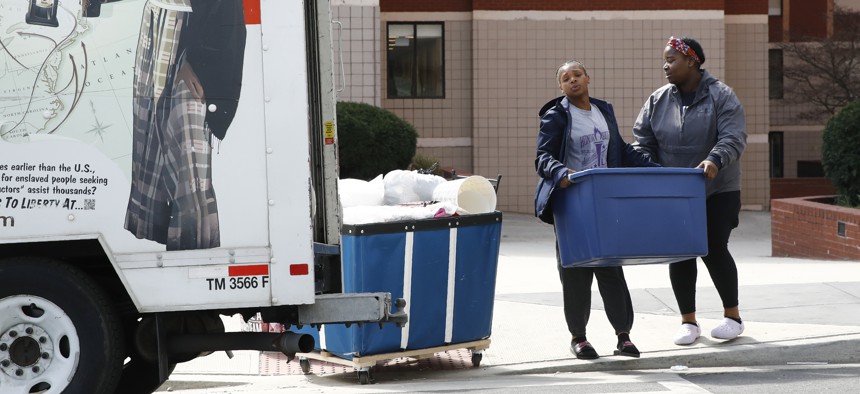3% of Americans Moved Due to the Coronavirus Outbreak

Howard University students Ayana Sallee, left, of Chesapeake, Va., and Jennifer Nnadozie, of Atlanta, load belongings into a U-Haul truck as they move out of their dorm in Washington, Wednesday, March 18, 2020. AP Photo/Patrick Semansky
A survey by the Pew Research Center found that Americans were most likely to have moved either to reduce their risk of infection or because their college campus closed.
Reports on the exodus of New Yorkers from the locked down city and about the flight of wealthy urbanites to vacation homes in remote locations make it sound as if Americans have eschewed city life in droves.
But a new survey found that the coronavirus has sent only a small portion of Americans packing.
Three percent of people surveyed by the Pew Research Center reported having moved permanently or temporarily due to the coronavirus pandemic, while 6% said that someone had moved into their home as a result. Another 14% said they knew somebody who had moved.
Younger Americans were more likely to have moved as a result of the outbreak, according to Pew. Almost one-in-ten adults between the ages of 18 and 29 said they moved, more than any other age group.
About 23% of all of those who had moved said they did so because their college campus had closed. Colleges and universities across the country began cancelling classes and sending students home in March. Many are still debating whether or not it is feasible for them to reopen in fall.
Of the other reasons given for a person’s move, the most popular (28%) was to reduce their risk of contracting Covid-19.
The results come from a survey of 9,654 people conducted between June 4 and 10.
People of different races and education levels show different likelihoods for having moved amid the outbreak. About 7% of Asian adults and 6% of Latino adults said they moved as a result of the outbreak, compared to 2% of white adults.
But among income and education levels, those with a bachelor’s degree were more likely to have either moved or known someone who moved than those without one.
The closure of schools and transition for many offices to remote work has increased the appeal for people to leave dense cities for rural retreats and vacation homes. Tourist towns, worried they will become the next outbreak hotspot, have sought to keep vacationers away.
Of the adults who moved, far more said they relocated to a family member’s home than to a second home or vacation home. Approximately 61% said they relocated to the home of a family member, while 13% said they went to a second or vacation home.
It is unclear how many of the moves will be permanent, but only 9% of the people who moved said they rented or purchased a new home.
Andrea Noble is a staff correspondent with Route Fifty.
NEXT STORY: Digital contact tracing’s mixed record abroad spells trouble for US efforts to rein in COVID-19





